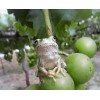和訳お願いします。
But after a while I begin to take brief glimpses,and at length I watch again
with thirsty interest, like a child who tries to maintain his sulk when he is offered the bribe of candy. My parents are now having their picture taken in a photographer's booth along the boardwalk. The place is shadowed in the mauve light which is apparently necessary. The camera is set to the side on its tripod and looks like a Martian man. The photographer is instructing my parents in how to pose. My father has his arm over my mother's shoulder and both of them smile emphatically. The photographer brings my mother a bouquet of flowers to hold in her hand, but she holds it at the wrong angle. Then the photographer covers himself with the black cloth which drapes the camera and all that one sees of him is one protruding arm and his hand with which he holds tightly to the rubber ball which he squeezes when the picture is taken. But he is not satisfied with their appearance. He feels that sonehow there is something wrong in their pose. Again and again he comes out from his hiding place with new directions. Each suggestion merely makes matters worse. My father is becoming impatient.They try a seated pose.The photographer explains that he has his pride, he wants to make beautiful pictures, he is not merely interested in all of this for the money. My father says: "Hurry up, will you? We haven't got all night." But the photographer only scurries about apologetically, issuing new directions. The photographer charms me, and I approve of him with all my heart, for I know exactly how he feels, and as he criticizes each revised pose according to some obscure idea of rightness, I become quite hopeful. But then my father says angrily: "Come on, you've had enough time, we're not going to wait any longer." And the photographer, sighing unhappily, goes back into the black covering, and holds
out his hand, saying: "One, two, three, Now!," and the picture is taken, with my father's smile turned to a grimace and my mother's bright and false. It takes a few minutes for the picture to be developed and as my parents sit in the curious light they become depressed.











お礼
有り難う御座いました。 聖典の意義は文言的、あるいは歴史的意味だけではなかなかしっくりと入ってこないものですね。 そのあたりの難しさがありますね。どうもありがとうございました。